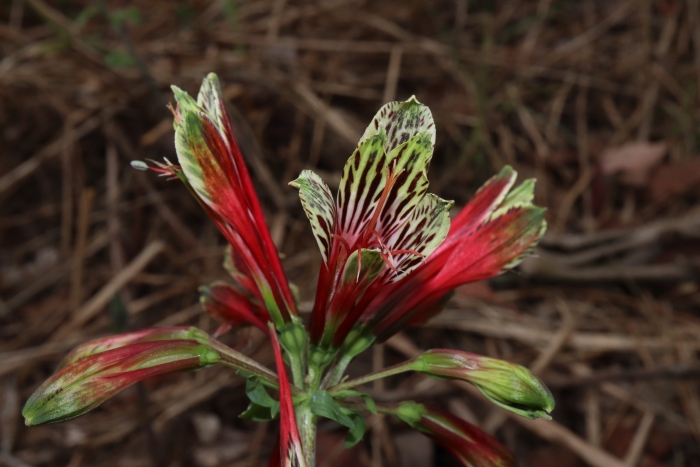Peruvian Lily
(Alstroemeria psittacina)
Peruvian Lily (Alstroemeria psittacina)
/
/

Thomas Mesaglio
CC BY 4.0
Image By:
Thomas Mesaglio
Recorded By:
Copyright:
CC BY 4.0
Copyright Notice:
Photo by: Thomas Mesaglio | License Type: CC BY 4.0 | License URL: http://creativecommons.org/licenses/by/4.0/ | Rights Holder: Thomas Mesaglio | Publisher: iNaturalist | Date Created: 2023-11-26T15:01:30-08:00 |

























Estimated Native Range
Summary
Alstroemeria psittacina, commonly known as Peruvian lily or parrot flower, is a perennial herb that is native to the open woodlands and grasslands of Brazil, Argentina, and Paraguay. This plant is characterized by its clumping habit and underground tubers. It typically grows to a height of 24-36 inches (60-90 cm) and spreads to a similar width. The Peruvian lily produces striking umbels of 3-8 trumpet-shaped flowers, which are red to reddish-purple, often with brownish spots and streaks, and bloom from late spring to early summer. The flowers are quite showy and attract pollinators such as bees and hummingbirds.
In cultivation, Alstroemeria psittacina is valued for its vibrant flowers and long blooming period, making it a popular choice for borders, containers, and cut flower gardens. It prefers full sun to partial shade, well-drained soil, and regular watering, especially during the growing season. While it can tolerate short periods of drought, consistent moisture will promote optimal growth and flowering. It is also relatively low maintenance, requiring minimal care once established. However, gardeners should be aware that it can spread vigorously by rhizomes and may need to be controlled to prevent it from becoming invasive. In regions where it is not native, such as Australia, New Zealand, Madeira, the Canary Islands, and the southeastern United States, it has escaped cultivation and can outcompete native species.CC BY-SA 4.0
In cultivation, Alstroemeria psittacina is valued for its vibrant flowers and long blooming period, making it a popular choice for borders, containers, and cut flower gardens. It prefers full sun to partial shade, well-drained soil, and regular watering, especially during the growing season. While it can tolerate short periods of drought, consistent moisture will promote optimal growth and flowering. It is also relatively low maintenance, requiring minimal care once established. However, gardeners should be aware that it can spread vigorously by rhizomes and may need to be controlled to prevent it from becoming invasive. In regions where it is not native, such as Australia, New Zealand, Madeira, the Canary Islands, and the southeastern United States, it has escaped cultivation and can outcompete native species.CC BY-SA 4.0
Plant Description
- Plant Type: Herb, Bulb
- Height: 2-3 feet
- Width: 2-3 feet
- Growth Rate: Moderate, Rapid
- Flower Color: Brown, Green, Red, White
- Flowering Season: Spring, Summer, Fall
- Leaf Retention: Deciduous
Growth Requirements
- Sun: Full Sun, Part Shade
- Water: Medium
- Drainage: Medium
Common Uses
Border Plant, Potted Plant
Natural Habitat
Native to the open woodlands and grasslands of Brazil, Argentina, and Paraguay
Other Names
Common Names: Parrot Lily, Lily Of The Incas, Parrot Flower
Scientific Names: , Alstroemeria psittacina, Alstroemeria atrorubra, Alstroemeria banksiana, Alstroemeria hassleriana, Alstroemeria psittacina var. longipedunculata, Lilavia psittacina,
GBIF Accepted Name: